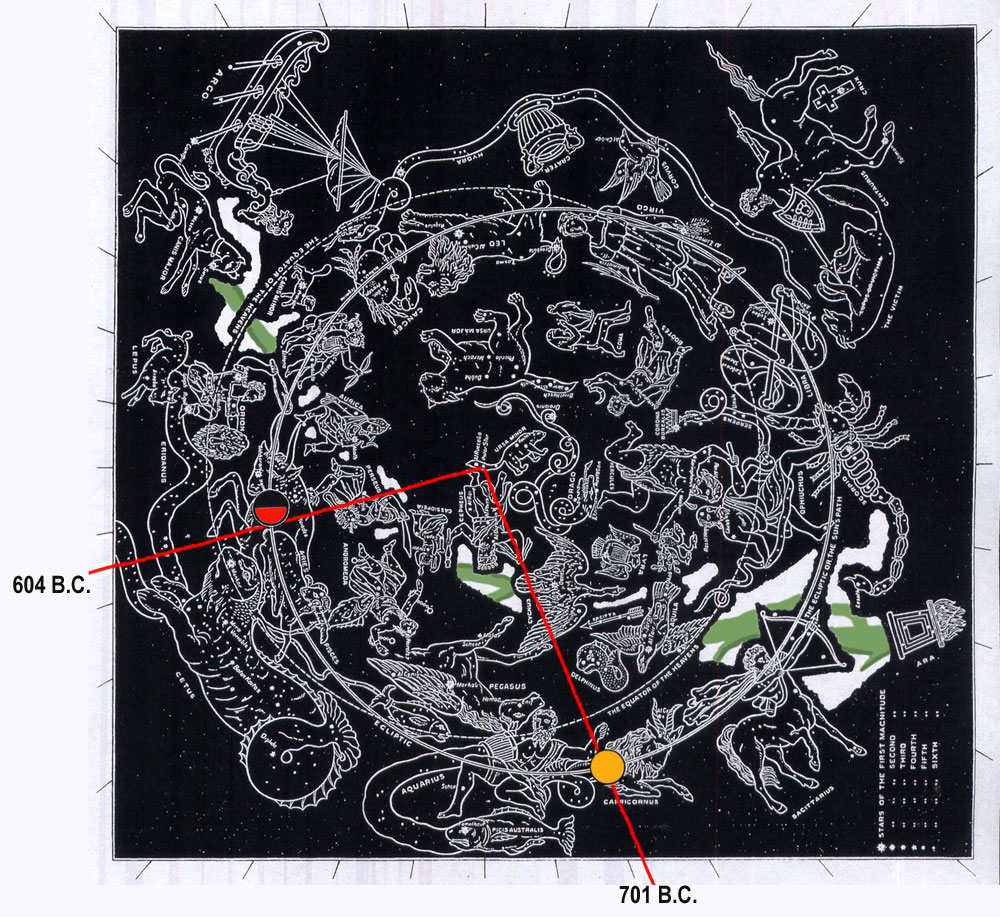

Isaiah Chapter 22:1-14 Star Chart: Clockwise from 701 B.C. when Aquarius or "Kir uncovered the (solar) shield" (22:6) at the time Sennacherib attacked Judah and besieged Jerusalem till "joy and gladness (Milky Way smile), slaying oxen (red lunar wound in Taurus), and killing sheep (Aries), eating flesh, and drinking wine" (red lunar cup drunk by Taurus)(22:13) when Jerusalem was conquered by Babylon in 604 B.C. is 97° years clockwise. |
|---|
Chapters 1, 22 and 33, with the narrative in 36, 37. All these refer to the only Assyrian invasion of Judah and siege of Jerusalem: that undertaken by Sennacherib in 701. It is, however, right to remember once more, that many authorities maintain that there were two Assyrian invasions of Judah-one by Sargon in 711, the other by Sennacherib in 701-and that chapters 1 and 22 (as well as Isaiah 10:5-34) belong to the former of these. The theory is ingenious and tempting; but, in the silence of the Assyrian annals about any invasion of Judah by Sargon, it is impossible to adopt it. And although Chapters 1 and 22 differ very greatly in tone from chapter 33, yet to account for the difference it is not necessary to suppose two different invasions, with a considerable period between them. Virtually, as will appear in the course of our exposition, Sennacherib’s invasion of Judah was a double one. 1. The first time Sennacherib’s army invaded Judah they took all the fenced cities, and probably invested Jerusalem, but withdrew on payment of tribute and the surrender of the casus belli, the Assyrian Vassal Padi, whom the Ekronites had deposed and given over to the keeping of Hezekiah. To this invasion refer Isaiah 1:1-31; Isaiah 22:1-25. and the first verse of 36.: "Now it came to pass in the fourteenth year of King Hezekiah that Sennacherib, King of Assyria, came up against all the fenced cities of Judah and took them." This verse is the same as 2 Kings 18:13, to which, however, there is added in 2 Kings 18:14-16 an account of the tribute sent by Hezekiah to Sennacherib at Lachish, that is not included in the narrative in Isaiah. Compare 2 Chronicles 32:1. 2. But scarcely had the tribute been paid when Sennacherib, himself advancing to meet Egypt, sent back upon Jerusalem a second army of investment, with which was the Rabshakeh; and this was the army that so mysteriously disappeared from the eyes of the besieged. To the treacherous return of the Assyrians and the sudden deliverance of Jerusalem from their grasp refer Isaiah 33:1-24, Isaiah 36:2-22, with the fuller and evidently original narrative in 2 Kings 18:17-19. Compare 2 Chronicles 32:9-23. To the history of this double attempt upon Jerusalem in 701-chapters 36 and 37 - there has been appended in 38 and 3 an account of Hezekiah’s illness and of an embassy to him from Babylon. These events probably happened some years before Sennacherib’s invasion. But it will be most convenient for us to take them in the order in which they stand in the canon. They wilt naturally lead us up to a question that it is necessary we should discuss before taking leave of Isaiah-whether this great prophet of the endurance of the kingdom of God upon earth had any gospel for the individual who dropped away from it into death. 2 Thou that art full of stirs, a tumultuous city, joyous city: thy slain men are not slain with the sword, nor dead in battle (black Zodiac). 3 All thy rulers are fled together, they are bound by the archers: all that are found in thee are bound together, which have fled from far. 4 Therefore said I, Look away from me; I will weep bitterly, labour not to comfort me, because of the spoiling of the daughter of my people. 5 For it is a day of trouble, and of treading down, and of perplexity by the Lord God of hosts in the valley of vision, breaking down the (red radius line) walls, and of crying to the mountains. 6 And Elam bare the quiver (Sagittarius) with chariots of men (Auriga) and horsemen (Centaur & Sagittarius), and Kir uncovered the shield (sun pulled out of the Aquarius leather bag). Kir—another people subject to Assyria (2Ki 16:9); the region about the river Kur, between the Caspian and Black Seas. 7 And it shall come to pass, that thy choicest valleys (Milky Way) shall be full of chariots (Auriga, etc.), and the horsemen (Sagittarius & Centaur) shall set themselves in array at the gate. 8 And he discovered the covering of Judah, and thou didst look in that day to the armour of the house of the forest (sun in Aquarius). 9 Ye have seen also the breaches of the city of David, that they are many: and ye gathered together the waters of the lower pool (green Milky Way). 10 And ye have numbered the houses of Jerusalem, and the houses have ye broken down to fortify the wall (white Milky Way). 11 Ye made also a ditch between the two walls for the water of the old pool (green Milky Way): but ye have not looked unto the maker thereof, neither had respect unto him that fashioned it long ago. 12 And in that day did the Lord God of hosts call to weeping (glistening star tears), and to mourning, and to baldness, and to girding with sackcloth (black Zodiac): 13 And behold joy and gladness (Milky Way smile), slaying oxen (red moon in Taurus), and killing sheep (Aries), eating flesh, and drinking wine (red lunar cup drunk by Taurus): let us eat and drink; for to morrow we shall die. 14 And it was revealed in mine ears by the Lord of hosts, Surely this iniquity shall not be purged from you till ye die, saith the Lord God of hosts.
|